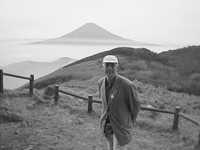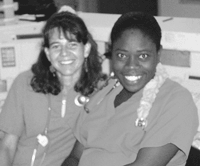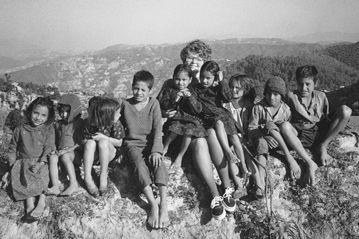The
ties that bind
From Sweden to Nepal, Emory nursing alumni share a desire
and ability to provide the best in patient care.
By Pam Auchmutey and Matt Huff
I
saw the diplomatic community as unique and applied the principles of
community health to that population. This community was different from
the host country and
had shared risk factors that required carefully designed programs for
medical care.—Michael Pate, 81MN

Before returning to the states this year, Michael Pate was assigned to the US Embassy in Tokyo, which allowed him to travel to Mount Fuji and other areas of Japan. Pate also was a medical attaché at the US embassies in Lima, Mexico City, Moscow, and Hong Kong.
In today’s complicated and interrelated world, nursing encompasses patient care in many ways. That’s one reason why the Lillian Carter Center for International Nursing was established. Through its efforts, the School of Nursing hopes to enhance nursing services and create a sustainable global workforce to improve health care worldwide. The center will also support the School of Nursing’s mission of educating nurses as strong, compassionate leaders who can work in highly developed or remote regions of the world. Here we meet four accomplished alumni who have done much to improve the delivery and management of health care in other regions.
A world traveler comes home
Michael Pate, 81MN, has been to China 48 times and many more places besides.
For the past 16 years, the nurse practitioner has served with the US State
Department as the medical attaché for the American embassies in
Lima, Mexico City, Hong Kong, Moscow, and Tokyo. At each post, Pate was
part of a medical team responsible for primary care, medical and emergency
referrals, disaster preparedness, and continuing education for medical
personnel.
“In many ways, working in the embassy health unit was like working
in a primary care unit in the United States,” says Pate. “I
was responsible for the health care of employees and eligible family members.
Dermatology, upper respiratory infections, minor trauma, well-child care,
pediatrics, and women’s health were all in the scope of practice.”
Pate also coordinated care for other embassy personnel stationed in the
regions where he served. While in Hong Kong, for instance, he traveled
regularly to consulates and the embassy in China to provide care and evaluate
local medical providers and hospitals. If the care proved inadequate,
Pate arranged for medical evacuation to the nearest appropriate facility
before an emergency occurred.
“Working overseas was a reality check for me regarding potential
referral and emergency medicine services,” says Pate, who returned
to the states this year. “In all cases, I had the best the host country
had to offer for hospitalization and outpatient facilities. I also had
to keep in mind that the best the host country had to offer was not always
acceptable. In some cases, I was the 911 authority for the diplomatic
community and had to respond to medical emergencies.”
Pate has traveled a long way from home in Tennessee, where he fell in
love with community nursing after working in a county mobile health unit
as a nursing undergraduate. “I was so taken with the experience that
I applied for a job with a community health unit,” he explains. “I
was accepted and started work six months after graduation as the first
male community health nurse in Tennessee.”
Later, when Pate decided to pursue a graduate degree, he chose Emory because
it offered a master’s in nursing as a clinical nurse specialist (CNS)
with a family nurse practitioner (FNP) component. “I wanted variety
in a career and believed that the CNS with the FNP skills would provide
that flexibility,” he says. “I was prepared to provide primary
care services to individuals across the life span.”
About that time, a friend of Pate’s encouraged him to consider a
career with the State Department. Before he knew it, he had applied and
was offered his first embassy assignment in Lima.
“I was interested in living in another country and experiencing other
cultures in depth,” Pate says. “I saw the diplomatic community
as unique and applied the principles of community health to that population.
This community was different from the host country and had shared risk
factors that required carefully designed programs for medical care.”
Pate’s experience in five countries made him the perfect choice for
his new, senior-level assignment in Washington, DC. As chief of medical
informatics for the State Department, Pate is spearheading the development
of a central electronic medical record system for all American embassies.
“The project needed someone with field experience to coordinate design
and implementation with the information technology experts,” he explains.
“Most electronic medical records are designed for small private practice
and not on a worldwide deployment scale. This is an exciting project that
requires working with many disciplines.”
Pate believes his nursing education at Emory has helped him “think
outside the box” and take risks to find better ways of doing things.
“The ability to influence others in positions of power for scarce
resources is a sign of strong leadership,” he says. Among other things,
“Emory taught me to be flexible, use systems theory, and look at
organizations and communities in a holistic manner.”
Taking
charge in Sweden
If it weren’t for the School of Nursing at Emory, Ann-Sofie Ljungdahl
Rhedin, 74N, might not have become a physician. Having lived in the United
States since age 4, Rhedin returned to Sweden armed with a BSN and practiced
nursing in geriatrics and neurology. Though she enjoyed the work and was
“good at it,” she was not content just to follow doctors’
orders. So she enrolled in medical school in Stockholm and began practicing
medicine in 1984.
“The doctor–nurse hierarchy was very much intact then,”
recalls Rhedin. “It did not leave much room for the nurse, who was
usually well educated and knew how to take initiative and document the
care that was needed or given. There were few, if any, researchers in
nursing. This made me very frustrated, of course. I wanted to use what
I had learned but couldn’t do so. I studied medicine to gain the
authority to make changes.”
Rhedin is a general practitioner and chief of a public health clinic in
Skogås, a suburb near Stockholm. In the meantime, she has watched
the nursing profession change rapidly, similar to what has taken place
in the United States.
“The status of nurses is on the rise, partly because of the large
nursing deficit throughout Sweden,” she says. “Nursing researchers
are increasing in numbers, and there is growing pride in nursing as a
profession. Care plans are becoming the norm. Standardized procedures
and treatment policies make the job less prone to errors. Most nurses
go though specialization training, which makes them very self-sufficient,
especially in the delivery room and the community.”
Rhedin has a demanding role herself between juggling long work hours and
caring for her immediate and extended family. “It has been very tough,”
she says. “It is a critical time in health care, with fewer funds,
doctor shortages, nursing shortages, and a government that expects more
and more from the health care system. A year ago, I hit the wall, as they
say here, and burned out. I am still not back at work but hope to return
this fall.”
Despite the difficulties, Rhedin is convinced that she would not have
come so far without the leadership skills she acquired in nursing school.
“The pride that was instilled in me at Emory is definitely a must
if one is to be a good leader,” she says.
“I’m sure I would not have become a physician if I had stayed
in the United States,” she adds. “The nursing situation in Sweden
made it necessary for me to continue studying. I feel very strongly that
in order for health care to maintain good standards and find new ways
of working, there needs to be more team work and less hierarchy.”
Challenges in the Caribbean
Stephanie Mason, 86Ox, 88N, has come full circle, in more ways than one.
Mason spent her first year out of nursing school as a general surgical
nurse at Crawford Long Hospital. After being away from Atlanta for several
years, Mason is back at Crawford Long working weekend nights in the cardiothoracic
unit. She also spends one night a week in the critical care unit at Fayette
Community Hospital in Fayetteville, Georgia, where Mason resides. Her
family settled there two years ago after returning from the Virgin Islands,
where Mason was on staff at the Roy L. Schneider Hospital in St. Thomas—the
same facility where she had worked as a teenager, in the same town she
was born.
 |
| Stephanie Mason, 86Ox, 88N, (left) worked several years as a hospital staff nurse in St. Thomas, the Virgin Islands. The hospital often treats patients from cruise ships and diving accidents in the Caribbean. |
Landing a nursing
position with the government-run hospital was no easy task, so she joined
a traveling nurses agency to get her foot in the door. “It took four
to five months to become a staff nurse,” Mason says. “The director
of nursing hooked me up with the agency until I could get on staff. Everyone
tries to help you because they understand how difficult it is to get hired
because of the bureaucracy.”
Once on board, Mason remained with the hospital for six years, first as
a medical surgical nurse and then as assistant head nurse in the ICU.
In turn, Mason worked with a number of traveling nurses who were hired
to fill critical staffing needs. “The hospital has 200 beds, but
only half were open,” she says. “The nursing shortage is a big
problem.”
Having worked at major hospitals in Georgia and Michigan, Mason was accustomed
to patient care provided by a variety of medical specialists. Although
the hospital in St. Thomas provided excellent medical services, it operated
without an interventional cardiologist and a neurosurgeon.
“We would have to send cardiology patients to other hospitals off
island for invasive procedures,” she explains. “Unfortunately,
the survival rate for stroke patients was not great. That was sad and
more frustrating to me than anything else.”
Because of the hospital’s location, Mason saw a number of patients
that most Caribbean medical facilities don’t see. “A lot of
cruises start in Puerto Rico, and St. Thomas is usually the next or last
stop,” she says. “If a patient became critically ill aboard
ship, it often would turn around and bring them to St. Thomas for treatment.
The hospital has the only hyperbaric chamber in the Virgin Islands, so
we treated a lot of people from there or neighboring islands who had been
in scuba diving accidents.”
Mason was there to lend a hand when a 1995 hurricane damaged the psychiatric
unit and destroyed the pediatric unit. “We set up MASH tents in front
of the hospital to serve as the ER until the hospital got things in order,”
Mason recalls. “We had no air-conditioning, no phones, no electricity.
We used the hospital generator for some time.”
No matter what hospital setting Mason finds herself in, her nursing education
has enabled her to persevere in the face of any challenge.
“My nursing instructors were very supportive. They want you to make
it, which keeps you going,” she says. “It’s not easy at
Emory. You have to work hard to succeed.”
A study in contrasts
As a child, Cathy McDonough, 78MN, 90MPH, would fantasize about the blue
and red nursing cape her mother had. That, combined with a sociable nature
and a desire to help others, led to a nursing career, including 13 years
with the Seventh-Day Adventist Church in Guam and Nepal.
 |
| Cathy McDonough has cared for patients in Guam and Nepal. She is pictured here with children from Banepa, the town where she lived and worked in Nepal. |
In Guam, McDonough
worked in a private clinic and had hospital privileges at a community
hospital. She served first as an adult nurse practitioner and returned
several years later as a nurse midwife. Because Guam is a US territory,
medical care is comparable in quality to the states, though patients must
be referred to the Philippines, Hawaii, or the continental United States
for certain specialized treatment. “During the years I served there,
the island faced health care cost challenges commensurate with stateside,
nursing shortages were evident, and there was insufficient bed capacity
for obstetrical patients,” says McDonough.
She also experienced a population mix unlike any other. “Island residents
are a wonderful microcosm of Chamorros (Guamanians), Philippinos, Japanese,
Chinese, other Micronesian islanders, Australians, statesiders, and others.”
Living abroad required certain concessions though. “Aside from adjusting
to typhoons, earthquakes, brownouts, and the high cost of living, I missed
being able to see my family more than once a year.”
In another part of the world, McDonough enriched her professional and
spiritual sides by volunteering two different times at Scheer Memorial
Hospital in Banepa, Nepal, where the contrast between spectacular natural
beauty and extreme poverty was striking. “I chose to serve there
because I wanted the experience of working in a developing country,”
she says.
During her first six-month stint, she volunteered as a nurse practitioner
but worked instead as a hospital nurse because of the nursing shortage.
As the only RN on a shift, McDonough cared for 50 patients as the medical
nurse, unit secretary, ER nurse, and midwife rolled into one. She contended
with not speaking the language, no previous midwifery experience, shortages
of medical supplies, differences in work ethic, and six-day work weeks.
“Each shift was a challenge, but it broadened my horizon,” McDonough
says.
In 1995, she returned to the small Christian hospital in Banepa, where
she planned to volunteer as a nurse midwife for three months. “I
stayed for two years and performed hospital administrative duties instead
because that was the greatest need.”
Today, McDonough is a midwife with Southwestern Medical Clinic in Michigan.
She returned to the United States to be close to her aging father and
to obtain financial stability. Still, if the right opportunity comes along,
she would love to work overseas again. “I greatly value the time
I’ve served internationally,” she says. “Without a doubt,
my terms of service in Guam and Nepal were some of the most challenging
of my life, but I wouldn’t trade them for anything.”